Staff stories and roles
See what our current team members are saying about their roles and journey into midwifery. This section also highlights the different roles available for you to choose a career path.
Abigail Lacey
Dartford and Gravesham NHS Trust
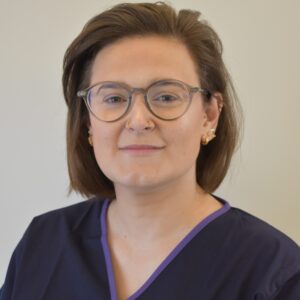
I wanted to be a midwife from age 13 when my parents decided to have another baby and as a family we followed the whole pregnancy together.
When my brother was born, it was fascinating. I remember so many details including the midwife, whose name was Anne Greene. She was so calm and her presence made us all feel safe as a family.
I remember seeing my brother crowning and only since becoming a midwife and a mother myself do I understand the strength my mum had during the birth.
Since that day, I was hooked and my school days were easy as I had a goal. University and my early career were difficult at times however this was my calling. I trained at Maidstone hospital then worked at both Maidstone and Tunbridge Wells hospitals until I transferred to Darent Valley Hospital in 2011.
I have loved everything about my experiences at DVH. I worked permanent nights while saving for a mortgage with my now husband. After having children, I then worked on the antenatal ward as a core member of staff because I have always been keen to work in educating women about their birthing options. I then applied to work in the education team and eventually as the preceptorship lead for the trust.
I am so enthusiastic about development of midwifery staff and creating solid foundations for those who are newly qualified to flourish in their careers. I love education and what it can do to a person’s confidence.
If you’re considering a career in midwifery, I would say ‘go for it’. Midwifery will open so many options for your own growth and development and the support within the profession is profound. You will meet so many people and work during all sorts of celebrations which make these moments even more special.
Louisa Petherick
Student Midwife
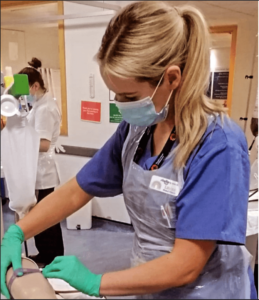
I’m in my third year of study at the University of Surrey and my placement site is the William Harvey Hospital. I have three young children and I’m a single parent – my life is busy with university study and at the hospital. I rely on wrap-around care provisions within my children's schools. I try to be as organised as I can and take each week as it comes, as to not allow myself to get too overwhelmed.
I had my eldest child at an early age and during the labour, I was supported by an exceptionally kind and caring midwife, who went above and beyond my expectations of the job role. I knew I wanted to work within a caring role, but it was at this time I realised I too would love the opportunity to help women and families. I had more children and found employment within care roles around school times to support my experience and knowledge. It was during my third maternity leave that I realised now was the time to do something for myself and to return to education to train within the profession I so admired. I wanted to support women with the compassion and kind-heartedness that I had previously been provided.
I started college one evening a week to gain my English and Maths GCSEs needed to gain a place on an Access to Nursing and Midwifery course at my local college two/three days a week for a year, where I also started as a student representative. It was daunting to be a mature student. I was also nervous about the potential impact this could have on my children as they were used to me always being around and at every school pick-up. I again started as the student representative for my cohort and feel my life experiences have been a great asset for this.
Now the end of my training is within reach, and I recognise all the brilliant experiences I have had during my training and the friends I have made. There have been life-changing moments – I have been honoured to have been able to support women, and I know my children can see a strong woman who has battled the odds to obtain a degree.
Hopefully, I’ve shown them it is never too late to chase your dreams.
Doreen Hambe-Manu
Medway NHS Foundation Trust
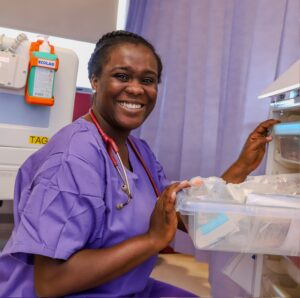
I’ve been a midwife for 10 years but I have recently started a new role as lead midwife for Equality, Diversity, Inclusion and Patience experience midwife. And also qualified as professional midwifery advocate.
My interest for midwifery started at age 15 when my mum was pregnant with my youngest sibling. I found her pregnancy journey interesting.
I have worked as a community midwife, safeguarding support midwife for mothers and birthing people under 22 years of age.
I have worked as a case-loading safeguarding midwife and in the last four years I have worked as a ward manager for both postnatal and antenatal ward manager.
My current role allows me to make sure that every person that walks through our door has excellent care regardless of who they are.
Midwifery is a rewarding career, but also a challenging one. Passion will carry you through.
Keeley Randall
Dartford and Gravesham NHS Trust
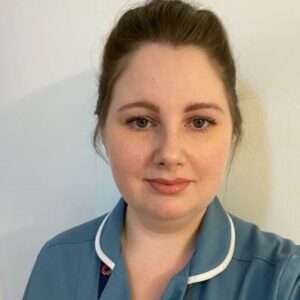
I’m a qualified accountant but decided to make the leap and change career in 2021.
I'd wanted to be a midwife from age 18 when I witnessed my first birth as a birthing partner to a friend – I just never had the confidence to make the jump into it. But the passion never left me and having my own children embedded this further.
In 2021, I started as a maternity support worker and the following year I was accepted on to the midwifery apprenticeship; I started the degree in January 2023 – I’m now halfway through the course.
What I love about midwifery is advocating for families and giving personalised care – no day is the same. It’s an honour to be a part of each family's journey into parenthood, whether it's for the first time or for another addition.
If anyone is considering a career in midwifery, I would say ‘do it’. I made the jump into midwifery age 35, with three small children, and I have not regretted a day yet. It's the hardest but most rewarding job and I wish I had made the jump from finance into midwifery sooner.
Kerry Bardoe
Dartford and Gravesham NHS Trust
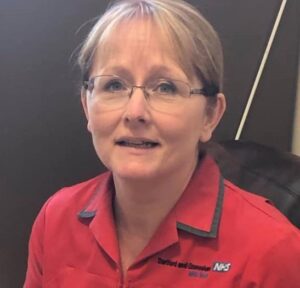
I started training as a nurse at Joyce Green Hospital in Dartford in 1991 and qualified as a staff nurse in 1994. By 1997, I was looking for another challenge and decided to start an 18-month course for midwifery.
I never thought midwifery would be my career path but wanted to do something completely different and at the very least add another string to my bow – 27 years later I continue to work in midwifery, so it was the correct decision to make.
I started as a qualified midwife in the maternity department at Gravesend Hospital and then moved with the department when we were relocated to Darent Valley in 2000. After working as a band 5 and then Band 6 clinical midwife, I began working as a delivery suite co-ordinator in 2009, then lead for delivery in 2011. I started my current role in 2014.
Being a midwife has always felt like a very privileged position. To feel like you have made a positive difference to a family, during one of the most important experiences of their lives is extremely rewarding. While I have far less interaction with women and their families in my current role, I now support colleagues and the service to continue to give a positive experience. I still feel as though I can make a difference.
To anyone considering midwifery as a career I would say be prepared to work hard, there will always be challenges but you will be joining a profession that will give you so much support, knowledge, positive experiences and job satisfaction.
Lianne Ashley
William Harvey Hospital, East Kent Hospitals University NHS Foundation Trust
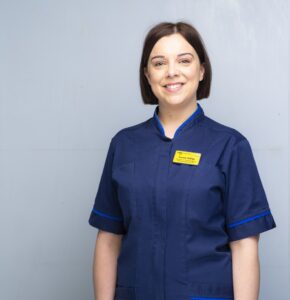
I have been working as a maternity matron for 18 months at East Kent Hospitals Trust and my feet have not touched the ground, it is a fast-paced role with no two days alike.
My journey in midwifery began nine years ago. The trust I placed in my own midwife inspired me to pursue a career in midwifery. If I could do that for other women and birthing people, what an amazing job that would be. Being trusted to care for families during one of life's main events is a privilege.
I have worked in various roles – I have worked within the community, been part of the core team on a midwifery led unit, been a labour ward coordinator and then stepped into a ward manager role for a short time. That journey led me to becoming a matron.
Each of these roles has contributed to my professional and personal development, helping me grow into the midwife I am today.
I am also Royal College of Midwives workplace representative.
The role of matron bridges both the clinical aspect of midwifery but also being able to transform the service and make positive changes for families and staff alike.
To anyone considering a career in midwifery, I would say it is a deeply fulfilling profession that allows you to make a real difference. It requires dedication, compassion, and endurance, but the rewards of helping bring new life into the world are unparalleled.
Sadie Hafford
Dartford and Gravesham NHS Trust
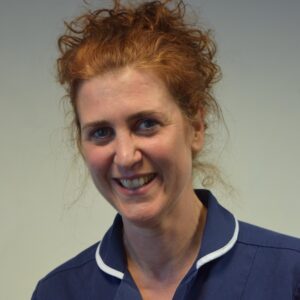
I started as a student nurse at the Royal London Hospital in 1986. Following this I transferred hospitals and consolidated my training on a surgical/orthopaedic ward.
I wanted to change specialisms so I applied to work on the special care baby unit – I worked there for 18 months and it really showed me what midwifery was about. That’s how and why I became a midwife.
After several years, I started working in antenatal care, and by being right place and right time, I started the joint diabetic clinic. In conjunction with this role, I also did infectious diseases and so my specialist role began.
Since then, I have set up two diabetic clinics at different trusts and adapted the joint clinic at DVH. I have added substance misuse clinics following national guidelines. I won an award for introducing a pre-conception diabetes clinic and auditing showing an improvement in outcomes.
I have recently been successful in a maternal medicine role – I have come full circle encompassing my nursing alongside my midwifery. It’s a real achievement.
I love my job. I love working with women who want change within their pregnancy. I love teaching and this is almost every day with women, families and colleagues. I love how I have seen a technological burst with new systems to enable better monitoring and improving outcomes for women. I love working with my work family. I love their support and seeing my friends every day.
Midwifery is a varied career and no two days are the same. I am always learning and adapting my practice and I hope this continues for many years.
Tomi Adebiyi
Medway NHS Foundation Trust
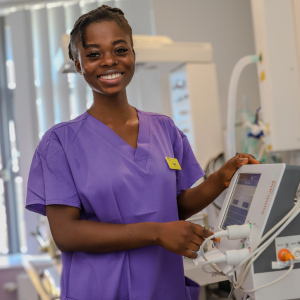
I decided to study midwifery when I graduated high school and I made the decision to come into the UK as an international midwife because I was keen on autonomous practice and gaining more knowledge and experience to help achieve safe and effective care to women throughout the pregnancy journey.
I have been working as a midwife now for more than two years and I am currently on my Band 5 rotation. This helps me to develop more skills and good clinical judgment, empathy and supporting families.
This has been an amazing journey for me.
What I love about being a midwife is helping families have an overall positive pregnancy and birthing experience and being able to help them achieve this is the best thing for me.
Midwifery is such a great career. It can be challenging but if you have a zeal for advocating for families, empowering women or have a special interest in midwifery, then you should do it.
Sally Sidhu
Maidstone and Tunbridge Wells NHS Trust
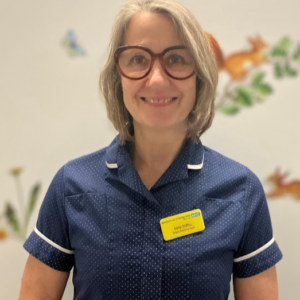
I started out life as a horse-riding instructor but decided to change careers. I did my nurse training, closely followed by midwifery training because I'd enjoyed the maternity placement of my nursing training and the relative autonomy enjoyed by the midwifery profession. Most of my working life I have been a community midwife, during which time I became passionate about home birth, continuity of carer and infant feeding.
In 2015 I became an infant feeding lead, which I absolutely love for a whole host of reasons. The main reason though is finding out all about the magical properties of skin to skin and breast milk.
Midwifery is a wonderful career. Perfect for anyone who is passionate about women's health, public health and healthcare equity for all. Midwives can change outcomes for families and communities, all for the good and it’s a real privilege.
Sorcha Magee
Medway NHS Foundation Trust
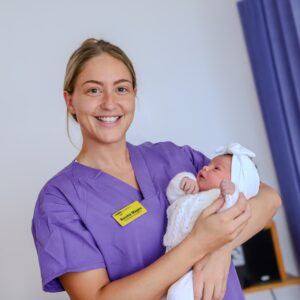
I qualified in September 2016 and I really do believe being a midwife is my vocation. I have had the opportunity to work in all areas of maternity from community to inpatient and fell in love with providing intrapartum care. I have had the opportunity to complete my masters in patient safety and human factors and progress to a specialist midwife in foetal wellbeing, education team lead and a ward manager.
Being a midwife is part of my identity – I would say it’s more than just a job to me. I enjoy every aspect of my role as a midwife and continually want to improve my skills.
I have worked at Medway Maritime Hospital since May 2022 and I’ve had the pleasure to be The Birth Place ward manager and now currently leading on education and workforce within maternity. This role allows me to lead in education as well as supporting our newly qualified midwives, student midwives and internationally educated midwives.
I love the job because it allows me to build a rapport with women and make sure they feel listened to, empowered in their journey through pregnancy and birth. I also have an amazing job within the education team that I can also empower and teach our staff through regular updates with training, supporting our newly qualified midwives as well as the opportunity to lead on our student midwives in their early career journey.
If you are interested in supporting women, being part of fantastic network of midwives to grow and learn from each other as well as be fulfilled in the journey of pregnancy and childbirth then definitely consider a career in midwifery.
Tamara Cumberbatch
Dartford and Gravesham NHS Trust
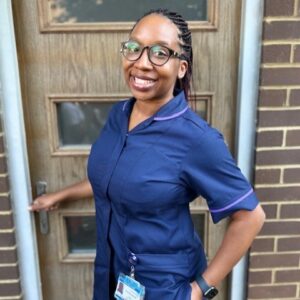
Photograph of Tamara Cumberbatch, Maternity Equality, Diversity and Inclusion (MEDI) Lead Midwife
My journey to becoming a midwife started age 10 when my mother was expecting my youngest sibling – I was fascinated.
At secondary school I studied child development and developed an interest in childhood early years and psychological development. This led me to my first degree in psychology.
It was my fourth and last pregnancy that reignited my love of midwifery, largely due to the personal care and compassion I received from the midwives looking after me. It was then I decided to pursue a career in midwifery.
After qualifying in September 2019, I trained and worked at Darent Valley Hospital as a rotational midwife.
As my experience and confidence grew, so did my awareness and knowledge of health inequalities, which increased my passion for advocating and caring for women from marginalised backgrounds. I wanted to make a difference and for the statistics to change for the better.
When the MEDI role became available at my trust, I jumped at the chance. I love learning new skills and knowing I am making a difference in a new way.
I love being a midwife and consider myself blessed to be able to share a family’s journey into parenthood, but also supporting them through difficult times and loss.
My passion and aim is to close the gap in health inequalities for those who experience poor outcomes. Seeing the differences that have been made so far is so encouraging and I am proud to be a part of the change.
If you are considering a career in midwifery – if this is your passion – go for it. It can lead to so many other specialities, skills, and paths... it really is a wonderful profession.
Sarah-Jane Cross
Medway NHS Foundation Trust
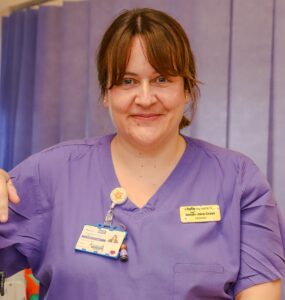
I started my midwifery training at 18 after completing my A Levels and was fortunate to know from a very young age that I wanted to be a midwife.
After qualifying in 2007, I was a rotational midwife for a few years and then became a core member of the delivery suite team where I have been ever since – I’ve been a midwife for 17 years now.
I love supporting and guiding women, birthing people and their families at such a life changing moment of their lives.
I love that no day is ever the same. I love the wonderful team I work with.
If you’re considering a career in midwifery, do lots of research to make sure it is the right career for you. But ultimately, be enthusiastic, kind and willing to learn.
Oh, and know how to make a good cup of tea!
What roles could I do?
Midwives provide care and support to women and their families while pregnant, throughout labour and during the period after a baby’s birth.
Training to become a midwife is a mix of academic study and practical, hands-on experience.
You’ll mainly deal with pregnant women requiring professional support and advice. You are likely to be the lead health professional and contact for a woman, providing evidence-based information and helping her make informed choices about the options and services available throughout her pregnancy.
You’ll be the expert on childbirth and your responsibilities are likely to be diverse.
You will:
- provide full antenatal care, including parenting classes, clinical examinations and screening
- identify high-risk pregnancies
- monitor women and support them during labour and the birthing process
- teach new and expectant mothers how to feed, care for and bathe their babies.
Nurses play a crucial role as part of the multidisciplinary team in providing safe and effective maternity care. Registered adult nurses, with post-registration experience, make valuable contributions to the delivery of high-quality care for women and babies throughout the maternity journey.
On the Delivery Suite and Postnatal ward, nurses work closely with their midwife colleagues, the delivery suite coordinator, and the wider multidisciplinary team. They focus on addressing the nursing requirements of women and babies, working within the framework of the Nursing and Midwifery Council's (NMC) Code of Conduct.
Nurses in maternity services are responsible for monitoring and maintaining policies and standards of nursing care. They collaborate with midwives and other healthcare professionals to ensure seamless, personalised care is provided to women and their families.
Interdisciplinary and multiagency working is essential in maternity services. It enables the delivery of the right care, by the right staff with the appropriate skills, in the right place and at the right time, as outlined in the National Quality Board's guidance. This approach maximises the expertise and scope of practice of both nurses and midwives, ensuring women and their families receive the best possible care.
Kent and Medway LMNS recognises the value of midwives and nurses working together, combining their unique knowledge and skills to prioritise people, practice effectively, preserve safety, and promote professionalism and trust. Relevant training, support, and mentoring are provided to nurses to develop new skills and knowledge, with the potential to progress into midwifery if desired.
Maternity support workers are the frontline of a family's journey through pregnancy, childbirth and the first few days of birth.
As a maternity support worker, you'll be under the supervision of a registered midwife. They are sometimes also known as maternity healthcare support workers or midwifery assistants.
They work in the community, postnatal wards, maternity theatres, delivery suites and midwifery-led units. You need to be able to cope with emergency situations and straightforward labour and birth.
As a maternity support worker you will:
- help to care for mothers and babies
- make routine observations (temperature, pulse, blood pressure, breathing, etc.)
- update records and other admin tasks
- educate parents one-to-one or in groups
- take blood samples for testing
- order stationery and equipment
- prepare equipment
- promote breastfeeding
- report problems to a registered midwife or nurse.
